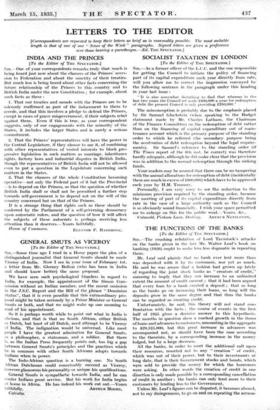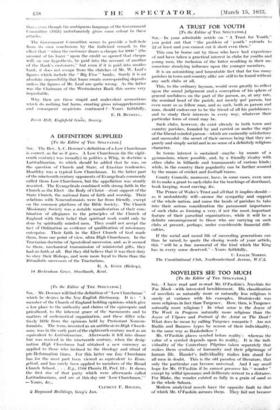• THE FUNCTIONS OF THE BANKS
[To the Editor of THE SPECTATOR.]
Sm,—The crushing refutation of Lord Tavistock's attacks on the banks given in the late Mr. Walter Leaf's book on banking (1926) ought to make him less dogmatic in repeating them.
.Mr. Leaf said plainly that no bank ever lent more than was deposited with it by its customers, nor - yet as much. He said he was aware that a fashion had grown up lately of regarding the joint stock banks as " creators of credit," meaning to imply that they can increase to an unlimited extent the amount of credit current ; that it had been argued that every loan by a bank created a deposit ; that so long as the banks go on increasing their loans, so long will the deposits grow in the same degree and that thus the banks can be regarded US creating credit.
Unfortunately, he said, this theory will not stand con- frontation with the facts ; the course of events in the first half of 1923 gives a decisive answer to this hypothesis. The months in question show a marked growth in the items of loans and advances to customers, amountingin the aggregate to 129,525,000, but this great increase in advances was accompanied not, as should have been the case according to the theorists, by a corresponding increase in the money lodged, but by a large decrease.
All the banks, in order to meet the additional call upon their resources, resorted not to any " creation " of credit, which was out of their power, but to their investments at long date, that is their Government stocks and bonds, which were sold to provide the money for which the borrowers were asking. In other words the creation of credit in one direction is only made possible by a corresponding cancellation of credit in another ; the banks can only lend more to their cuitomers by lending less to the Government.
Unless Mr. Leaf's figures can be disputed, it becomes absurd, not to say disingenuous, to go on and on repeating the accusa-
lions. even though the ambiguous language of the Government Committee (1931) unfortunately gives some colour to these attacks.
The Government Committee seems to provide a bolt-hole from its own conclusions by the italicized remark to the effect that " when the customer draws a cheque for £900" (the amount of his loan) "upon the credit so opened that cheque will, on our hypothesis, be paid into the account of another of the Bank's customers," but even if it is paid into another bank. it does not escape from the clutches of Mr. W. Leaf's figures which include the "Big Five" banks. Surely it is an absolute impossibility that loans create corresponding deposits unless the figures of Mr. Leaf are quite wrong. As the latter was the Chairman of the Westminster Bank this seems very improbable.
Why then are these stupid and malevolent accusations which do nothing but harm, creating gross misapprehensions and consequent suspicions continued ?—Yours faithfully, Beech Hill, Englefield Green, Surrey.
E. H. RETHELL.











































 Previous page
Previous page